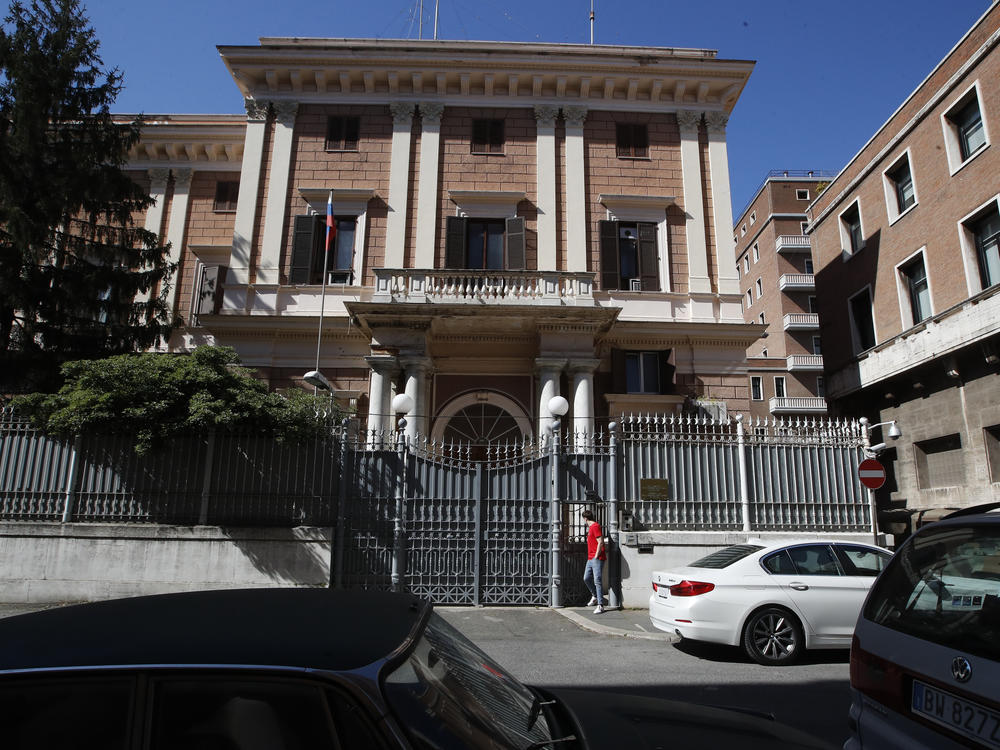Section Branding
Header Content
Italy Expels 2 Russian Embassy Officials, Arrests Navy Captain On Spying Charges
Primary Content
Three decades after the end of the Cold War, it appears the Italian capital Rome is reviving its role as "Open City" – a crossroads of international espionage and intrigue.
Italy today ordered the expulsion of two Russian embassy officials following the arrest of an Italian Navy captain on spying charges. The captain, identified by Italian media as Walter Biot, was reportedly caught Tuesday evening as he handed over allegedly top-secret documents to one of the Russian diplomats in exchange for money.
Foreign Minister Luigi Di Maio summoned the Russian ambassador and told the Italian Senate the alleged exchange is "a hostile act of extreme gravity". He did not elaborate on the alleged role of the second Russian in the incident.
The Carabinieri paramilitary police said in a statement that the sting operation was carried out after a long investigation in cooperation with Italy's domestic intelligence body and the Defense Ministry. It said its agents caught the two men red-handed immediately after they exchanged documents and money.
The Carabinieri said they are accused of "serious crimes concerning espionage and state security," with a penalty of more than 10 years in prison.
The documents related to military telecommunications, according to the Italian news agency ANSA, raising potential security concerns for Italy's NATO partners.
The Russian Embassy in Rome confirmed the detention of a diplomat stationed in the military attaché's office, adding only, "we hope it will not affect bilateral ties."
In Moscow, the Russian Foreign Ministry issued a terse statement voicing regret about the diplomats' expulsion. It said its "possible steps in connection with the situation that does not conform with the level of bilateral ties will be announced later."
Italian commentators point out the unprecedented nature of the alleged incident, saying that never in Italy has a Russian Embassy official been arrested in the act of paying for secret documents.
The daily La Repubblica reported that the incident is also awakening memories of concerns aired a year ago, when Italy became Europe's epicenter of the coronavirus pandemic. Denied at the start any assistance from its European partners, then-Prime Minister Giuseppe Conte welcomed Russian President Vladimir Putin's offer of a Russian brigade specializing in chemical warfare and disinfecting toxic substances — raising questions about how useful it would be in combatting the virus.
For two months, members of the brigade, clad in white hazmat suits, had free rein in the pandemic-hit Lombardy region. Italy's NATO allies, the newspaper reported, expressed their suspicions that the so-called humanitarian brigade was actually a cover for espionage activities.
Those suspicions were heighted by the fact that the Russians spent substantial time around the Ghedi air base near Brescia, where nuclear armaments are stored.
Tuesday's arrests also awaken memories of the Cold War, when Rome was a chessboard on which numerous intelligence agencies played against each other.
In the 1980s, Rome was the stage of many operations by Libyan hit squads, CIA, Israeli and KGB agents. The Italian capital, with its many embassies and large crowds of tourists, was a favorite site for Soviet defections – or apparent defections.
Several diplomats or visiting journalists are said to have dropped out of sight while on sightseeing tours of the city, or the Vatican City-state. Some later reappeared in Moscow, claiming they had been kidnapped by Western agents.
The latest incident, some commentators said, is also sign of a Russian disinformation offensive aimed at delegitimizing the Italian government and confirms that Italy remains on the front line of new 21st century geo-political confrontations.
Copyright 2021 NPR. To see more, visit https://www.npr.org.

